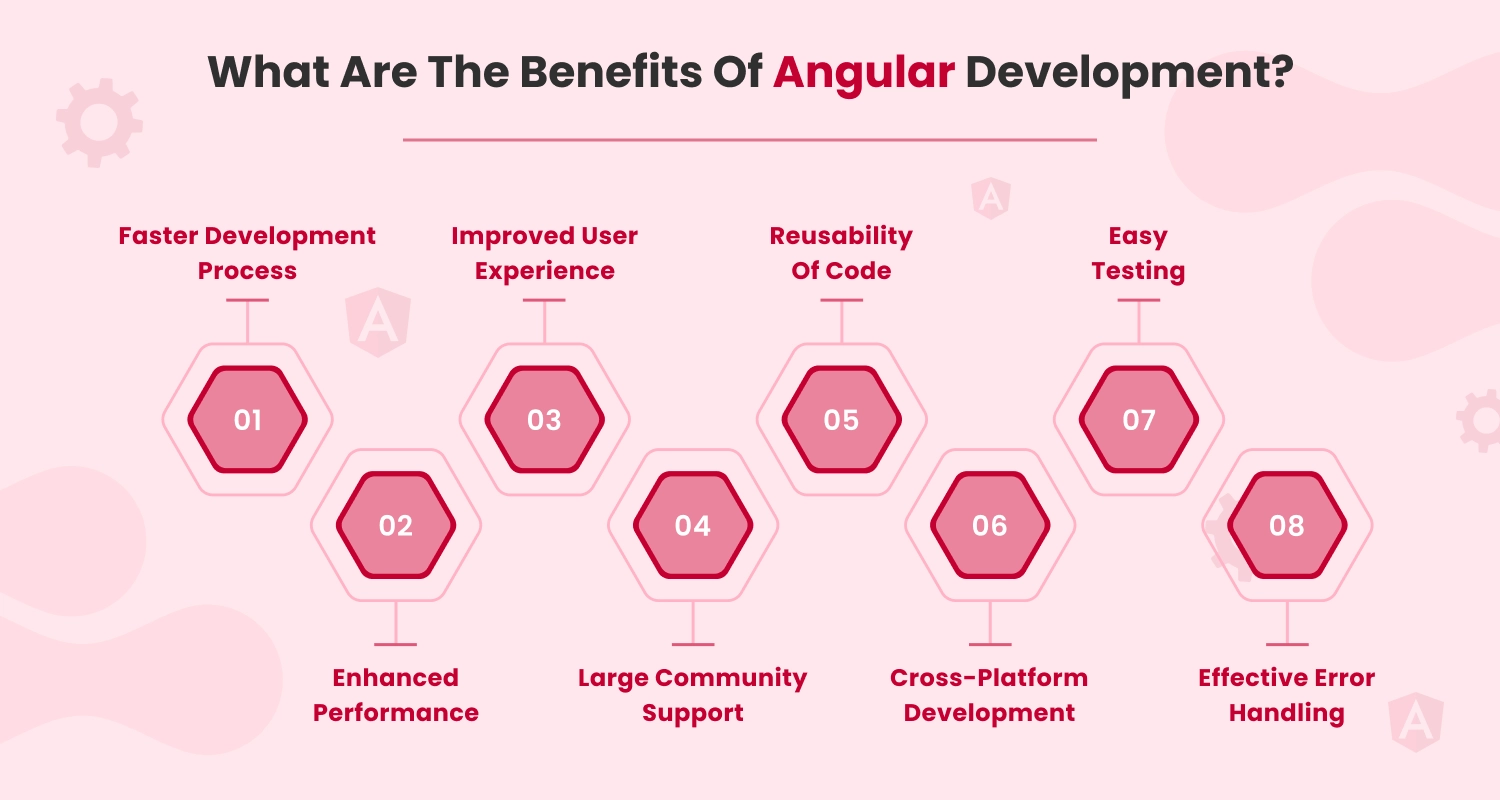Angular web development has revolutionized the way developers build web applications. With its robust features and functionalities, Angular has become one of the most popular frameworks for building dynamic and responsive web applications. Angular has gained a lot of popularity due to its simplicity, scalability, and flexibility.
Its modular architecture, two-way data binding, and dependency injection make it easy for developers to build complex applications without compromising on performance. In this article, we will discuss the benefits of Angular web development and how it can benefit businesses and developers.
Whether you are a seasoned developer or a business owner looking to build a web application, understanding the benefits of Angular can help you make an informed decision.
What is Angular?
Google maintains the open-source Angular framework for front-end web development. It is widely used for building complex and responsive web applications. Angular simplifies the development process by providing a set of tools and features that help developers build scalable and modular applications.
With Angular, developers can easily build dynamic user interfaces and handle complex data models. Angular Development services are provided by many software development companies that specialize in building web applications using Angular. These services include Angular consulting, Angular web application development, Angular maintenance and support, and Angular migration services. Companies that use Angular can benefit from its rich features and functionalities, including dependency injection, two-way data binding, and reusable components. Overall, Angular is a powerful framework that helps developers build modern, feature-rich, and responsive web applications with ease.
What form did Angular 2 take?
Angular 2, the second major version of the Angular framework, was released in 2016. It was a complete rewrite of the original AngularJS framework, which was released in 2010.
The decision to rewrite the framework came about due to the limitations and issues that AngularJS faced as web development technology evolved. AngularJS had become difficult to maintain, and its performance was often inadequate for large-scale applications.
Angular 2 was designed to address these issues, with a focus on modern web development practices, performance, and scalability. The framework was rewritten in TypeScript, a superset of JavaScript that adds features such as static typing, making code more maintainable and easier to debug. The introduction of new concepts such as components, modules, and dependency injection further improved the framework’s structure and efficiency.
Angular 2 also marked a significant shift in the way web applications were developed, with a focus on component-based architecture and reactive programming. The release of Angular 2 laid the foundation for the continued evolution and success of the Angular framework in the years to come.
What Is the Purpose of Angular?
Angular is a popular front-end web development framework that is used to create dynamic and responsive web applications. It is used to build complex and feature-rich applications that require a high degree of interactivity, such as e-commerce platforms, social networking sites, and business management systems.
Angular is a component-based framework that allows developers to create reusable components and templates, making it easier to build large and complex applications. It also provides features such as two-way data binding, dependency injection, and routing, which simplify the development process and enhance application performance.
Angular is widely used in various industries, including healthcare, finance, e-commerce, and social media. It is favored by businesses and developers for its efficiency, scalability, and ease of use, making it a popular choice for building web applications that require high performance and user engagement.
What are the benefits of Angular development?

Angular is a widely used front-end web development framework that has revolutionized the way developers build web applications. Angular provides a set of tools and features that make it easy for developers to build scalable and modular applications. In this article, we will discuss the benefits of Angular web development and how it can benefit businesses and developers.
1. Faster Development Process
Angular provides a set of tools and features that simplify the development process, making it faster and more efficient. The framework’s modular architecture and reusable components allow developers to easily create complex applications without writing repetitive code. Additionally, Angular’s templates, which are built using HTML and Angular-specific syntax, enable developers to create dynamic user interfaces quickly and easily.
2. Enhanced Performance
Angular’s performance is one of its greatest strengths. The framework is designed to run fast, even when dealing with large and complex applications. Angular’s two-way data binding system, which keeps the view and the model in sync, ensures that data updates are reflected in real-time. Angular also utilizes change detection, which optimizes the application’s performance by only updating the parts of the page that have changed.
3. Improved User Experience
Angular makes it easy to create highly interactive and engaging user interfaces. Developers can construct reusable UI components that can be used throughout the application using the directives and components of the framework. Angular’s reactive programming model also makes it easy to handle complex user interactions, such as form submissions, without having to write complex code.
4. Large Community Support
Angular has a large and active community of developers who contribute to the framework’s development and provide support to other developers. This means that developers can easily find resources, tutorials, and answers to their questions. The community also creates and maintains third-party libraries and tools that can be used to extend Angular’s capabilities.
5. Reusability of Code
One of the key benefits of Angular is its reusability. Angular allows developers to create reusable components that can be used across different parts of the application. Time is saved, and the application is made consistent as a result. Angular’s dependency injection system also makes it easy to reuse services and other code modules, reducing code duplication and increasing maintainability.
6. Cross-Platform Development
Angular’s capabilities go beyond just web development. The framework can be used to build mobile and desktop applications using frameworks like Ionic and Electron. This allows businesses to build applications that work seamlessly across different platforms, without having to build separate applications for each platform.
7. Easy Testing
Angular makes it easy to write unit tests and end-to-end tests for applications. The framework’s dependency injection system makes it easy to mock services and other dependencies, making testing more efficient. Additionally, Angular provides tools and libraries that simplify the testing process, making it easier for developers to ensure that their code works as intended.
8. Effective Error Handling
Angular provides developers with robust error-handling capabilities. The framework’s error handling system allows developers to easily catch and handle errors, ensuring that the application runs smoothly even when errors occur. Angular also provides developers with tools for debugging and troubleshooting, making it easier to identify and fix errors quickly.

How Angular Web Development Benefits Businesses?
Reduced Development Cost
Angular web development offers a cost-effective solution for businesses. Its modular design and easy-to-use tools reduce development time and effort. Angular’s pre-built templates and components make it easy to develop complex applications without the need to write code from scratch. As a result, developers can save a lot of time, which translates into reduced development costs for businesses.
Scalability and Flexibility
Angular is designed to handle complex applications and is highly scalable. Angular web development allows businesses to create applications that can handle a large amount of data, making it an ideal choice for businesses that require flexibility and scalability. Angular’s modular architecture enables developers to add new features and functionalities to an existing application easily.
Improved Productivity
Angular web development offers several features that improve productivity, such as dependency injection, two-way data binding, and reusable components. These features enable developers to build applications more efficiently and with less code. The Angular CLI (Command Line Interface) simplifies the development process by providing pre-built templates, libraries, and tools, further boosting productivity.
Simplified Maintenance
Angular web development makes application maintenance easier by providing features such as the Angular Universal, which enables server-side rendering. This feature allows developers to create applications that can be easily updated and maintain, reducing the time and effort required for maintenance.
Increased ROI
Angular web development offers a significant return on investment (ROI) for businesses. Its cost-effectiveness, scalability, flexibility, and productivity features make it an ideal choice for businesses that require robust and high-performing applications. Angular’s ability to handle complex applications and its ease of maintenance translates into long-term cost savings, leading to increased ROI for businesses.
Angular-built Websites
Web developers usually employ the Angular front-end framework to build cutting-edge, interactive websites. Many companies and groups now use it as their primary web development tool. Some well-known sites that made use of Angular include:
- Forbes
- IBM
- Microsoft
- Udacity
- Upwork
Issues with Angular
While Angular is a popular front-end framework used by many web developers, it also has some shortcomings that developers should be aware of. Here are some of the most significant limitations of Angular:
Steep Learning Curve
Angular has a steep learning curve, which means that developers need to invest a significant amount of time and effort to master the framework. The complex architecture and syntax of Angular can be challenging for beginners to understand.
Performance Issues
Angular’s complex architecture can lead to performance issues, particularly when working with large-scale applications. The framework’s extensive data binding can slow down an application’s performance.
Limited SEO
Angular is a single-page application (SPA) framework, which can limit its SEO capabilities. Search engines may not be able to index the content of an Angular application, which can affect its search engine ranking.
Compatibility Issues
Angular updates frequently, which can lead to compatibility issues between different versions of the framework. This can cause problems when integrating Angular with other technologies or frameworks.
Code Bloat
Angular generates a lot of boilerplate code, which can bloat an application’s codebase. This can make it difficult to maintain and debug an Angular application.
The Prospects for Angular
Angular is a popular front-end framework that has gained a lot of traction since its release in 2010. With its robust architecture and extensive features, Angular has become a favorite among web developers for creating dynamic and responsive web applications. Where then does Angular go from here?
Continued Growth
Angular’s popularity is expected to continue to grow in the coming years, with more businesses and organizations adopting the framework for their web development needs.
Integration with Other Technologies
Angular is expected to become more integrated with other technologies and frameworks, such as React and Vue.js, allowing developers to combine different tools to create more powerful applications.
Improved Performance
Angular is continually being updated and improved, and future versions are expected to address the performance issues that some developers have reported. Improvements in performance are likely to make Angular more competitive with other popular front-end frameworks.
Enhanced User Experience
Angular is expected to continue to prioritize user experience, with future versions of the framework providing even more tools and features for creating dynamic and engaging web applications.
Expansion into Other Areas
Angular’s success in web development could lead to its expansion into other areas, such as mobile app development or desktop applications.
You may like this: Cost to Hire an Angular Developer
Conclusion
Angular web development offers numerous benefits to businesses, including reduced web development costs, improved user experience, scalability, and simplified maintenance. These advantages make Angular a popular choice for building web applications that require high performance and user engagement. If you’re looking to develop an Angular-based application for your business, consider hire Angular developers who have the expertise and experience to deliver high-quality and efficient applications.
Frequently Asked Questions
Is Angular Necessary for Web Development?
No, Angular is not necessary for web development, but it can be a helpful tool for building complex and dynamic web applications.
Why is Angular Better than HTML?
Angular is not necessarily better than HTML, as they serve different purposes. HTML provides the structure and content of a web page, while Angular is a JavaScript framework used to build dynamic and interactive web applications.
Why Do Companies Still use Angular?
Companies still use Angular because it offers a wide range of benefits such as scalability, flexibility, improved productivity, simplified maintenance, and cross-platform development, making it a reliable and popular choice for building web applications.







